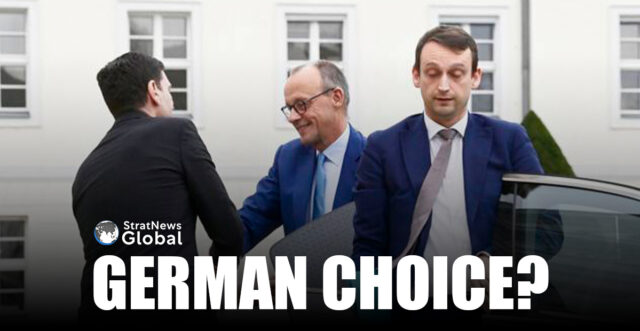With just ten weeks remaining until Germany’s federal elections, conservative leader Friedrich Merz is solidifying his position as the likely successor to Chancellor Olaf Scholz.
Merz, whose party maintains a double-digit lead over its nearest rival, has been garnering attention as the country’s potential next chancellor.
The 68-year-old’s recent visit to Kyiv showcased his growing stature on the international stage. Standing beside Ukraine’s President Volodymyr Zelenskyy, Merz criticized Scholz for withholding advanced missile systems from Ukraine, accusing him of forcing Kyiv to “fight with one hand tied behind its back.”
He also called on European leaders to prepare for the possibility of Donald Trump returning to the U.S. presidency.
Initially viewed as a transitional leader for the Christian Democratic Union (CDU), Merz’s journey to the party’s helm has been marked by persistence. Following Angela Merkel’s departure as CDU chair after nearly 19 years, Merz lost leadership bids in both 2018 and 2021 before finally succeeding in 2022.
His admirers hail him as a strategic tactician. The collapse of Scholz’s coalition government last November stemmed in part from Merz’s legal challenge to the budget, triggering a financial crisis that undermined the coalition.
In his campaign, Merz has emphasized economic reforms, including tax cuts, deregulation, and incentives to encourage employment. While hinting at a possible relaxation of Germany’s strict constitutional spending cap, he has assured voters that such changes would fund infrastructure investments rather than unsustainable expenditures.
Merz’s career spans decades in politics and the private sector. After rising to CDU parliamentary leader in the early 2000s, he left public office during Merkel’s chancellorship and spent 15 years in corporate roles, including positions at BlackRock and HSBC Germany.
A hobby pilot, he owns two airplanes and maintains a reputation as a disciplined, detail-oriented leader.
However, Merz’s rhetoric has sparked controversy.
Critics recall remarks like his 2023 characterization of ethnic minority boys as “little pashas” on a talk show, which he later defended as necessary to address issues in schools. He also faced backlash for suggesting Ukrainian refugees were exploiting Germany’s welfare system, a comment he later apologized for as “inaccurate and insensitive.”
As Merz edges closer to achieving his long-held ambition of becoming chancellor, he appears to be exercising greater caution in his public statements.
Former CDU legislator Andreas Nick noted Merz’s increasing awareness of the weight his words carry, stating, “He clearly feels whatever he says has to be weighed against the fact that he might soon be Chancellor.”
Despite occasional missteps, Merz’s disciplined messaging and policy focus have resonated with voters. Polls show the CDU leading with 32% support, far ahead of Scholz’s Social Democrats (SPD) at 16%. While Merz still lags in personal popularity compared to his party, his appeal among male voters has surged, with 56% favoring him over Scholz.
Merz’s critics argue that his traditionalist roots sometimes clash with the expectations of a modern electorate. Yet his charitable endeavors, such as funding scholarships for underprivileged children in his hometown, have drawn praise even from opponents.
As Germany’s political landscape grows increasingly volatile, Merz’s ability to navigate these challenges will determine whether he can secure the chancellorship and guide the country through its economic and social turmoil.
(With inputs From Reuters)
In a career spanning three decades and counting, Ramananda (Ram to his friends) has been the foreign editor of The Telegraph, Outlook Magazine and the New Indian Express. He helped set up rediff.com’s editorial operations in San Jose and New York, helmed sify.com, and was the founder editor of India.com.
His work has featured in national and international publications like the Al Jazeera Centre for Studies, Global Times and Ashahi Shimbun. But his one constant over all these years, he says, has been the attempt to understand rising India’s place in the world.
He can rustle up a mean salad, his oil-less pepper chicken is to die for, and all it takes is some beer and rhythm and blues to rock his soul.
Talk to him about foreign and strategic affairs, media, South Asia, China, and of course India.





